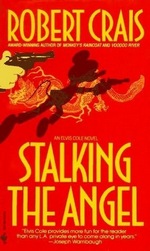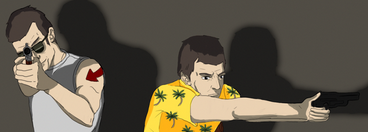 Stalking The Angel by Robert Crais
Stalking The Angel by Robert Crais
Series: Elvis Cole, #2
Mass Market Paperback, 260 pg.
Crimeline, 1992
Read: August 13 – 14, 2014

Okay, here we go with the second Elvis Cole adventure — I hesitate to call this a mystery, the amount of investigating that Elvis performs before finding what he’s been hired to is pretty minimal. What can I say, the guy’s got himself some great instincts.
The book opens with a great visual — Elvis is doing a headstand in the middle of his office when in walks the man who will go on to hire him, and his lawyer — “the best looking woman [Elvis has] seen in three weeks.”
I said, “You should try this. Invigorates the scalp. Retards the aging process. Makes for embarrassing moments when prospective clients walk in.”
Bradley Warren is not amused, but is in a hurry and needs an investigator so he sticks around to hire Elvis.
Crais packs a lot into the description of Warren’s lawyer — giving us his initial impressions of her, as well as revealing a little about himself to (re-)familiarize readers to his character, in addition to the obvious physical description:
Jullian Becker was in her early thirties, slender in gray pants and a white ruffled shirt with a fluffy bow at the neck and a gray jacket. She held a cordovan Gucci briefcase that complemented the gray nicely, and had very blond hair and eyes that I would call amber but she would call green. Good eyes. There was an intelligent humor in them that the Serious Businesswoman look didn’t diminish.
They explain, Warren does a lot of business (he’s a very influential and wealthy man, they make sure Elvis realizes) with Japanese investors — and in a promotional stunt, he’d arranged a loan of one of the few original copies of The Hagakure from the thirteenth-century, and it was stolen from his home safe. He needs it back in a couple of days, and as distasteful as he fins Elvis, he needs his help. He and Elvis spend a little time annoying each other, before Elvis relents — for Jullian’s sake — and agrees to help find the manuscript. While Warren and Becker jet off to Japan, he starts investigating at the scene of the crime, where he runs into Warren’s very drunk wife who makes several passes at Elvis. Tiny spoiler: Elvis keeps it in his pants for the whole book. Maybe having established his noir cred in Monkey, Crais didn’t have to keep that going (not that Elvis doesn’t notice attractive women, flirt, etc).
Elvis taps a source for someone who dabbles in stolen art and leans on him to get an idea who’d have motive and means to steal The Hagakure, he gets a name. Elvis pushes the dabbler to the edge of despair — he know that his world could come crashing down around him and ruin the lives of his family. Elvis is disturbed by that, musing to his cat later,
“You ever notice . . . that sometimes the bad guys are better people than the good guys?”
It’s a small moment, but reveals a lot about Elvis that the reader needs to know without just telling us the information. The bad guy as a better person (and vice versa) is something we’ll see again in this book — and frequently from here out.
Elvis takes that lead he bullied out of that man and finds someone with ties to the yakuza — and the LAPD task force watching him. Things don’t go well with either group and he has to bring Joe into the picture. Oddly, things escalate with Warren and he starts receiving threats. But he goes ahead with business as usual. After failing to convince him to cancel a public event despite these threats against him and his family, Elvis and Joe help out with security in a location almost impossible to secure.
Pike drifted up to me. “This sucks.”
That Joe.
“I could off anybody in this place five times over.”
“Could you off someone and get away with you here?”
Head shake. “I’m too good even for me.”
Technically, Joe didn’t joke there — but he came close.
Things get worse from there, spiraling out of control and pushing Elvis to the brink. Which allows Crais to explore the friendship between the two — Pike spends a lot of time reassuring Elvis, trying to keep him from going over the edge. With more sensitivity than he showed Ellen Lang in Monkey, Pike’s there, keeping Elvis on track.
“You were doing your best for her, something that no one in her life has ever done.”
“Sure.” Mr. Convinced.
“Ever since the Nam, you’ve worked to hang on to the childhood part of yourself. Only here’s a kid who never had a childhood and you wanted to get some for her before it was too late.”
I know I noticed that theme of protecting childhood — Elvis’ own, and others’ — as I read the series before, but I don’t think I saw how prominent it is, this will be interesting to track.
Speaking of Joe, we get more of the Pike myth — at some point the FBI gets involved in the case. The agent talking to Elvis knows Pike’s name, and understands something of his reputation. He doesn’t want to meet Joe, but he does want to take a look at him. The Agent’s attitude is different than the LAPD’s, Pike’s not despised by him, it’s more like an urban legend that he gets to verify exists. Later, Elvis and Joe have to do a little skulking around a home that the police have staked out, and Pike stays back in case he’s recognized by them. By this point, Crais is making sure you’re wondering what’s going on here.
Elvis — both in dialogue and in narration — is still funny, but I think there are fewer jokes per inch in this book, but I think they’re funnier. Elvis cracks me up, and I appreciate that. He also drops the jokes toward the conclusion, when things get violent and deadly. I noticed that some readers were critical of Elvis’ joking at the similar point in the last book, and Crais must’ve seen something similar twenty years ago — or it’s just him being more disciplined as an author. Hopefully the latter, but I’d assume the former is possible.
Crais seems more confident, more sure of his characters and story this time out — as he should be, this is a stronger book. In addition to a strong hard-boiled detective story, we see themes of friendship, honor; the protection of childhood; criminals acting nobly, “good guys” who need someone like Elvis to threaten to kill them.
A very successful sequel to The Monkey’s Raincoat, Stalking the Angel secures Crais’ place at the top of the field. That’s about all I have to say about it, so I’ll see you next week for one of my favorites, Lullaby Town.
—–

—–
Drawing by Kirsty Stewart, chameleonkirsty on deviantART, used with permission.


Read Irresponsibly, but please Comment Responsibly